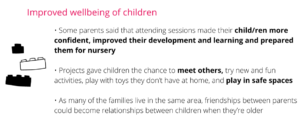Supporting London’s social fabric as we recover from Covid-19
The Covid-19 pandemic has had a devastating impact on our city and our country, but it has also highlighted the power of relationships and local connections.
Over the course of the pandemic many of us have relied on the kindness of neighbours and friends for vital practical and emotional support. Never have we so clearly seen the value of strong support networks and their role in sustaining the wellbeing and resilience of communities.
Recent research published by the Institute for Social and Economic Research showed that school closures were responsible for a significant decline in mental health experienced by mothers during the pandemic, perhaps as a result of missing the social connections of the school run or the time to connect with friends in other ways.
As Deputy Mayor for Communities and Social Justice, it is my responsibility to highlight the importance of tackling the deep inequalities and divides that exist in our communities, all of which were worsened through the pandemic. Reducing inequalities and promoting a fairer, more connected city is key to London’s recovery.
Supporting local communities
We know large gaps exist between different families’ everyday experiences of childcare, housing, work and access to London’s opportunities. These gaps make it harder to generate understanding between individuals and communities.
We launched the London Family Fund to test an approach to modify this and generate major changes for families across London. Including:
- Creating stronger and more diverse social networks
- Reducing parental isolation and loneliness; and
- Improving child wellbeing outcomes.
The Fund supported innovative projects that work to improve connections among families of young children across London and help build relationships between families from diverse backgrounds by creating shared experiences.
For example, a Centrepoint sheltered housing scheme provided support to young mothers at risk of homelessness and their children during lockdown by running music therapy sessions, child-friendly cooking sessions, and ‘jump around’ PE classes once a week. These activities gave these young mothers an opportunity to meet and build relationships with other young mums living in the same accommodation.
Impact
The impact of these projects have the potential to be transformational. They have enabled us to tackle some of the isolation and loneliness that parents can experience by improving connections, helping them to develop strong and long lasting support networks and contribute towards a sense of belonging and positive wellbeing for them and their families.
Data from a small sample of projects shows they have helped the parents involved to:
- Build new relationships and create support networks, meaning they feel less lonely and more connected to their local area.

- Gain skills which have enabled them to look for employment or enter education.

- Improve the confidence and wellbeing of their children, helping to better prepare them for the transition to nursery.

Recommendations for similar projects
We have also identified a set of recommendations for organisations and funders wishing to run or support similar programmes that build relationships between diverse families:
- Develop parent leaders or ambassadors. Having ‘influential’ parents on board can help to spread awareness among the community, support outreach and ensure sessions are parent-led.
- Advertise the benefits for the child to engage parents – for many parents their first thought was how their child will benefit.
- Use local amenities or services – for example schools, baby banks, shopping centres, or playgrounds, to help with outreach and awareness. This makes it easier and convenient for parents to attend.
- Use online networks and social media to promote projects, as well as enable interactions beyond the project sessions between parents and with project staff.
- Incorporate activities that create interaction between parents, for example, by getting parents to share experiences or work on something together.
- Provide a creche or informal childcare – to allow parents to properly engage in certain activities and have time to interact with each other away from their children.
- Ensure sessions are open, friendly and non-judgemental and that they accommodate different cultures and groups.
- Allow and encourage the whole family to participate.
- Implement co-design into projects to improve engagement with projects through a sense of ownership.
- Allow different levels of parent involvement in designing and running projects – some parents have benefited from being actively involved in projects. However, not all may be comfortable taking on roles with greater responsibility.
- Consider the duration and frequency of projects – for parents to form meaningful relationships, they need time for these to develop.
If delivering under social distancing guidelines:
- Use break-out rooms when delivering projects online to allow participants to build connections through interaction in smaller and more intimate group discussions.
- Support those who are digitally excluded to participate – if projects are run online, provide equipment and training to support people to participate. Consider whether people can effectively take part through dialling-in on the phone, or if video access is needed.
The long-term social and economic impacts of the pandemic will continue to affect London’s social fabric. Prioritising work that builds local relationships will support the wellbeing and resilience of our communities as the capital recovers.

